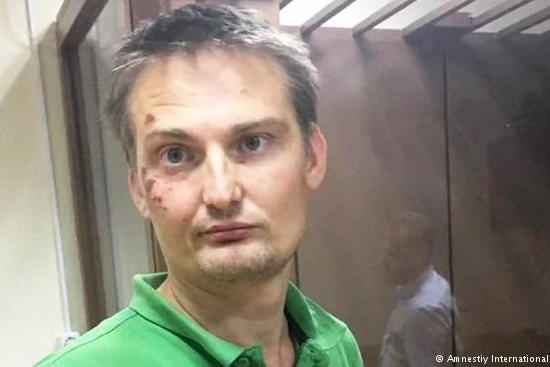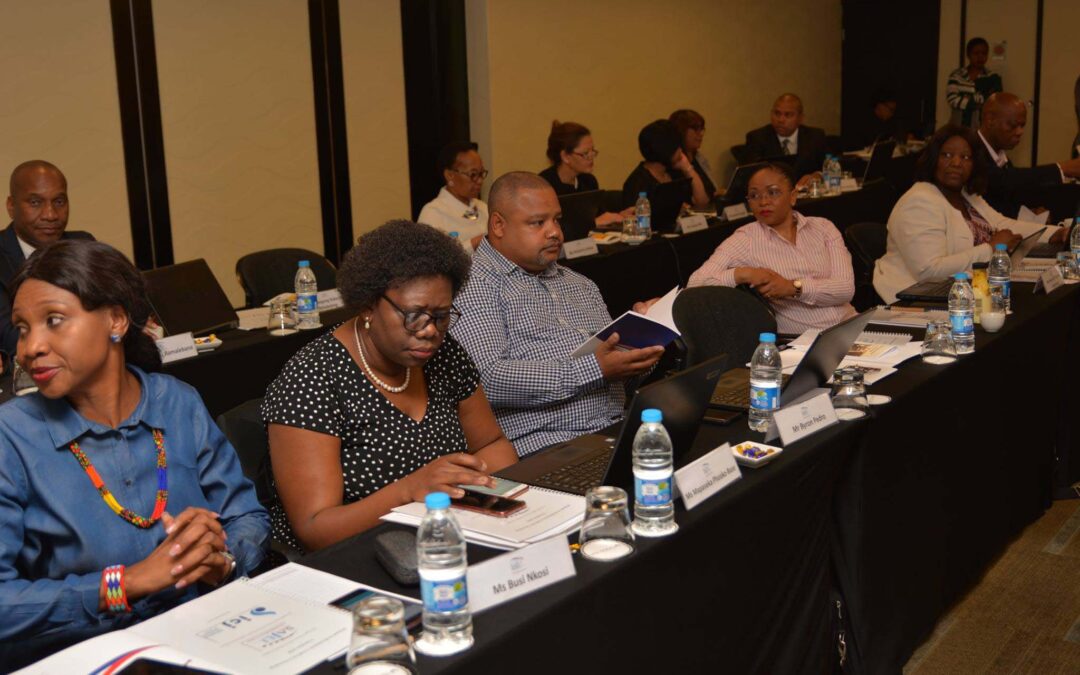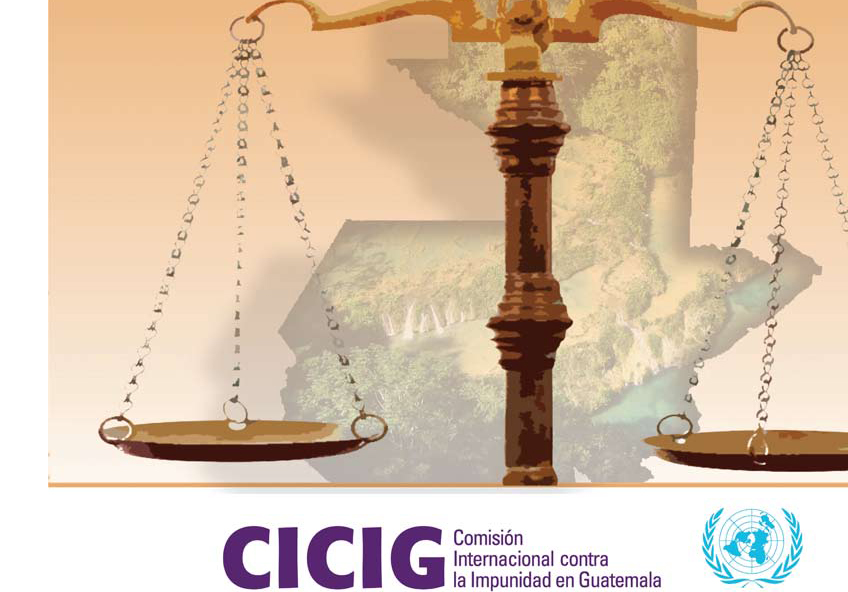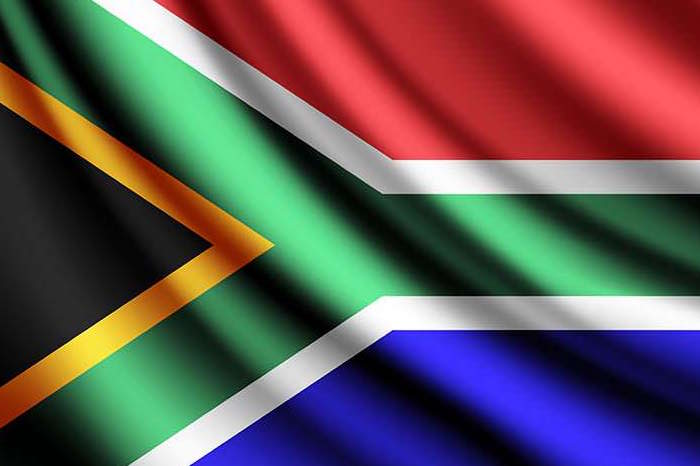
Oct 3, 2018 | News
Today, the ICJ expressed concern at ongoing criminal proceedings against Mikhail Benyash, a lawyer practicing in Russia, who is charged with use of force against the police and impeding justice.
The lawyer has been detained until 23 November. The ICJ called on the responsible authorities to drop any criminal charge relating to his conduct of professional duties in the courtroom, and to ensure that the lawyer’s rights are protected and that allegations of his ill-treatment are fully investigated.
Benyash alleges that following his apprehension by the police on 9 September, the police beat him up in the car. According to the police report he inflicted the injuries on himself, contrary to demands of the police that he stop doing so.
He was charged with disobedience to the police, which according to the police report was due to “the fact that the police asked Benyash not to injure himself, but he continued self-beating”. Benyash was convicted and sentenced to 14 days of imprisonment and 40 hours of correctional works.
On 23 September, the day of his release, Benyash was arrested again. He was charged with two further offences: violence against a representative of authority (Criminal Code Article 318(1)) based on an allegation, seemingly not raised at the time of his earlier charge and conviction in relation to the same incident, that in the course of his arrest on 9 September he allegedly bit a police officer and hit another.
On 23 September he was also charged with obstruction of justice (Criminal Code Article 294(1)), reportedly on the basis of an allegation that in a court hearing on 6 May 2018, Benyash had “repeatedly interrupted, gave instructions and objections to the decisions of the judge” and after he had been removed from the courtroom “continued unlawful behaviour”.
According to the lawyer, he was taken out of the courtroom by force due to his motions to allow certain members of the public to be present at the open hearing.
The ICJ is concerned that the criminal obstruction charge against Mikhail Benyash appears to relate at least in part to statements he made in court in the course of carrying out his professional duties of representation of his clients.
The fact that this charge was only laid following his recent arrest, some five months after the alleged incident occurred, also raises questions as to the motivation for bringing the charge forward now.
“Benyash is currently charged on account of his alleged attack on a police officer and obstruction of justice. While the first charge requires an impartial and independent inquiry, the second charge should be of concern to the entire lawyers’ community”, said Karinna Moskalenko, ICJ honorary member. “We fear that this may lead to lawyers in Russia being charged with obstruction of justice simply for actively expressing their position and objections in accordance with the procedure prescribed by law”, she added.
Furthermore, the ICJ emphasises that under international human rights law, states have obligations to investigate allegations of treatment that may amount to torture or inhuman or degrading in violation of Article 3 of the European Convention on Human Rights, as well as other international law norms binding on the Russian Federation.
The investigative authorities have duty to investigate allegations of ill-treatment of the lawyer by police following his arrest on 9 September promptly, effectively and impartially and any persons responsible should be brought to justice.
Read the ICJ’s full statement here: Russia-Statement on Benyash-News-Web Story-2018-ENG

Oct 3, 2018 | Communiqués de presse, Nouvelles, Plaidoyer
Les dirigeants européens doivent agir rapidement pour aider l’Aquarius, dernier navire de recherche et de sauvetage non-gouvernemental opérant en Méditerranée, à s’immatriculer après le retrait de son pavillon par les autorités panaméennes, ont annoncé aujourd’hui cinq organisations internationales des droits de l’Homme dans une lettre ouverte (uniquement disponible en anglais).
La lettre a été envoyée aux dirigeants européens à l’occasion du cinquième anniversaire du naufrage de Lampedusa, qui a fait au moins 368 morts, les exhortant à offrir un pavillon à l’Aquarius.
«l’Aquarius a sauvé des dizaines de milliers de vies en mer, comblant ainsi le vide laissé par les États», a déclaré Judith Sunderland, directrice adjointe par intérim de Human Rights Watch pour l’Europe et l’Asie centrale, au nom des organisations. «Quel meilleur hommage à ceux qui sont morts au large de Lampedusa il y a cinq ans que de veiller à ce que l’Aquarius, symbole de solidarité et de respect de la vie et de la dignité humaines, puisse continuer à sauver des vies».
La lettre a été signée par Amnesty International, Human Rights Watch, le Conseil européen sur les réfugiés et les exilés (ECRE), la Commission internationale de juristes (CIJ) et la Fédération internationale des droits de l’Homme (FIDH).
SOS MEDITERRANEE et MSF ont lancé une pétition ici (uniquement disponible en anglais).
Pour plus d’informations et pour organiser une interview, veuillez contacter:
Róisín Pillay, Directeur de programme auprès de la CIJ Europe: + 32 2 734 84 46; ou roisin.pillay@icj.org
La lettre complète est disponible ici: Europe-Aquarius Letter-Advocacy-Open Letter-2018-EN (uniquement disponible en anglais)

Oct 3, 2018 | News
Today, the South African Judicial Education Institute (SAJEI) and ICJ held a workshop for judicial officers on housing rights in terms of South African and international human rights law.
The workshop, which was held in Johannesburg, was attended 46 participants from South Africa’s 9 provinces. It formed part of a “Human Rights Week For Judicial Officers” run by SAJEI, which on other days also covered “Refugee Rights”, “LGBTI Rights”, and “Gender and HIV”.
The objective of the SAJEI-ICJ workshop was to discuss the role of judicial officers in housing rights cases.
The content of the workshop was collaboratively determined in consultation with magistrates responsible for conducting the training of other magistrates around the country.
It sought to respond to their requests information and resources to assist in their daily decision-making.
The workshop was facilitated by a range of magistrates from around the country and judicial educators at SAJEI.
A keynote address on “Constitutional Imperatives on Rights to Housing” was presented Judge Antonie Gildenhuys, a retired judge who sat both on the High Court and the Land Claims Court in South Africa.
Workshop facilitators drew on a draft manual on housing rights, which the ICJ is working with SAJEI and a working group of magistrates to develop.
The manual’s particular focus is on international human rights standards from a range of sources including the International Covenant on Economic Social and Cultural Rights, general comments of the Committee on Economic, Social and Cultural Rights.
It is hoped that, when finalized, magistrates will be able to draw on this manual to assist in their adjudication of housing rights cases.
To assist judicial officers in understanding the challenges faced by communities advocating to prevent unlawful evictions and secure access adequate housing, Mr Thapelo Mohapi (General Secretary of Abahlali baseMjondolo) and Ms Susan Mkhwanazi (Slovo Park Community Forum) were asked to make presentations on their “lived experiences” in attempting to access protection on the right to housing.
Their important insights contributed immensely to the success of the workshop and were well received by the magistrates.
Opening remarks were delivered by Dr Gomolemo Moshoeu (CEO of SAJEI) and Mr Arnold Tsunga (Africa Director of the ICJ).
“We at the ICJ are very happy that the magistrates expressed a desire for more continuous legal education in the area of legal enforcement of economic and social rights given that historically very little attention has been paid to equipping magistrates with requisite information and resources to ensure consistent application of human rights standards in this area,” reflected Arnold Tsunga after the event.
Contact:
Timothy Fish Hodgson, ICJ Legal Adviser, t: +27828719905 ; e: timothy.hodgson(a)icj.org

Oct 1, 2018 | News
The Inter-American Commission of Human Rights (IACHR) held a special hearing on the role of the International Commission against Impunity in Guatemala (CICIG) in Boulder, Colarado.
Ramón Cadena, the ICJ Director stated “We regret that the Government of Guatemala requested the IACHR to hold the hearing behind closed doors since all the points discussed were of public interest. The discussions should have been open to the press and the general public. We urge the authorities to ensure there will be no retaliations against the work carried out by human rights organizations and human rights defenders.”
The ICJ welcomed the participation of many NGOs at the event and the frank dialogue that took place on this crucial issue for human rights in that country. The Guatemalan government delegation claimed that the Inter-American System of Human Rights was not competent to consider the matter. However, the IACHR maintained it was competent, according to the American Convention of Human Rights and other regional human rights legislation. As an “external observer”, the IACHR stated it was “surprised” by the latest decisions taken by government authorities at the highest level not to extend the CICIG mandate nor allow the entry of Commissioner Iván Velásquez into the country. It considered these decisions were “excessive” and in no way strengthened the rule of law in Guatemala.
The government delegation further argued that the CICIG acted as a “parallel prosecutor” which affects the internal order of the country. The NGO delegation stated that on the contrary the CICIG acted as a “complementary prosecutor”. The delegation further noted that before the CICIG mandate was approved, the Constitutional Court, in an opinion published in the official gazette on 8 May 2007 (document no 791-2007), considered that the CICIG did not violate the constitutional order nor the rule of law in Guatemala.
The Constitutional Court referred to the CICIG as having “the function of supporting, assisting and strengthening the state institutions responsible for investigating crimes committed by illegal and clandestine security forces .. and does not exclude the possibility of receiving support from other institutions in the collection of evidence, provided that the participation has been established in a legal manner, as in the present case.”
The IACHR considered that the essential question was whether the State of Guatemala already had the judicial independence and strong institutions necessary to fight against corruption in Guatemala without the support of the CICIG. The NGO delegation considered, based on different arguments, that the presence of the CICIG in Guatemala was still necessary.
The IACHR also informed the government delegation that it was in their interest to invite an in-situ visit of the IACHR as soon as possible so as to better understand the human rights situation.
The ICJ Director for Central America Ramón Cadena participated in the hearing at the request of the Central American Institute for Social Democracy Studies (DEMOS), the Committee for Peasant Development (CODECA) and the Network of Community Defenders. The Indigenous Peoples Law Firm had been requested to attend by these organizations but was unable to do so at the last moment.

Oct 1, 2018 | Advocacy, Non-legal submissions
Today, the ICJ makes a submission to the UN Committee on Economic, Social and Cultural Rights in advance of Committee’s examination of South Africa’s initial periodic report under the International Covenant on Economic, Social and Cultural Rights.
South Africa ratified the Covenant in 2015. This is the first time that the Committee has the opportunity to review a report from South Africa on the implementation of its Covenant obligations.
The ICJ’s oral submissions will focus on the rights to work and an adequate standard of living.
The ICJ’s full written submissions also include emphasis on the rights to education, work and housing of persons with disabilities and recommend that the Committee recommend that the Government of South Africa make time-bound commitments to participative processes leading to:
1. The full domestication of Covenant in South African law
2. A comprehensive review of South Africa’s domestic laws and policies on ESC rights to ensure that they are implemented consistently with South Africa’s obligations in terms of the Covenant; and
3. The ratification of Optional Protocol to the International Covenant on Economic, Social and Cultural Rights.
In a joint statement with other civil society organizations, ICJ Legal Adviser Timothy Fish Hodgson said: “Unlike the South African Constitution, the International Covenant on Economic, Social and Cultural Rights contains a right to work. By ratifying the Covenant in 2015, the government has made a legally binding commitment to progressively eliminate unemployment and ensure that all work – whether in the formal or informal sector – is decent work.”
“As a result, for example, “both the level of the national minimum wage and measures taken by the government to combat South Africa’s 37.2% unemployment rate, should be evaluated in terms of the rights to work and the right to an adequate standard of living,” he added.
The ICJ’s oral submission is available here: South Africa-South Africa Review-Advocacy-Non Legal Submission-2018-ENG
The ICJ’s full written submissions are available here
The South African government’s full report to the Committee is available here
A live stream for the Committee’s proceedings is available here









